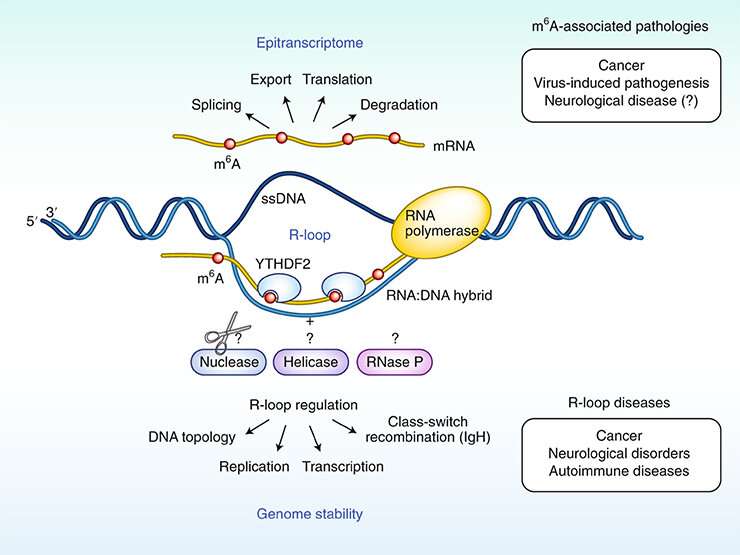The arbiters of truth, nominated by Big Tech, tells you in no uncertain terms that mRNA vaccines (in itself a lie - they are not vaccines by any established criteria) DO NOT ALTER YOUR DNA.
Researchers at CCR identified a novel modification in human messenger RNA (mRNA) that dramatically impacts gene expression. NAT10, an enzyme, was found to be responsible for the modification, which itself has been implicated in cancer and aging. This is one of the first examples of a unique chemical modification to mRNA (a key factor in deciphering the genetic code) that causes an increase in protein production. The study, by Shalini Oberdoerffer, Ph.D., Investigator in the Laboratory of Receptor Biology and Gene Expression, and colleagues, appeared November 15, 2018, in Cell.
Deciphering the genetic code is a multi-step process that begins with transcribing information contained within DNA to a messenger RNA; the resulting mRNAs are then translated into proteins that comprise key components of the cell. It is known that RNA can be uniquely modified following the transcription process as a means to regulate function. This study provides a first example of a chemical modification to mRNA that enhances protein production. The investigators suggest the modification alters the efficiency by which the genetic code is read within each strand of mRNA.
The researchers focused on a specific chemical modification to mRNA, N4-acetylcytidine (ac4C). They first mapped the presence of ac4C to thousands of human mRNAs. In the lab the scientists next determined that the presence of ac4C within mRNAs powerfully enhanced their ability to be translated into protein. They further demonstrated that ac4C impacted cell proliferation, a hallmark of cancer cells.
“We hope to one day harness this discovery to specifically direct the modification to key mRNAs, thereby creating novel therapeutics,” said Dr. Oberdoerffer.
The researchers’ next steps are to map out how the modification specifically functions to alter gene expression as well as to determine if misregulation is a root cause of certain diseases.
Summary Posted: Thu, 11/01/2018
https://ccr.cancer.gov/news/article/a-novel-mRNA-modification-may-impact-the-human-genetic-code
An article titled "m6A RNA modification as a new player in R-loop regulation," by the Dynamic Gene Regulation research group led by Arne Klungland at IMB, was published in the January edition of Nature Genetics.
Following a new collaboration between UiO and research groups in Nottingham and Oxford, it has now been revealed that RNA has a direct effect on DNA stability, according to Professor Klungland's research.
He believes the discovery will provide the health service with an important tool, since many studies have shown that the regulation of modifications to RNA is important for the development of cancer.
If genes that are important for the chemical compound 6-methyladenine are completely removed, this results in neurodegeneration in both mice and humans.
Where and how
In areas of DNA where RNA binds to one of the DNA threads in such a way that the complementary DNA thread becomes the sole thread (R-loop structures), the DNA stability will change if RNA is chemically modified by m6A.
"Several research groups are now working together to study what effect this can have on the DNA molecule. We already know that R-loop areas are associated with sequences of DNA containing active genes and that this can lead to chromosomal breakage and the loss of genetic information," explains Klungland.

New field of research
Normally, epigenetic gene regulation is studied by examining dynamic modifications of DNA and proteins—so-called epigenetic modifications. The modifications can turn genes on or off without changing the underlying genetic code.
Less than 10 years ago, it was discovered that dynamic modifications also exist in RNA and that these have an important role to play in gene regulation
Important modification
The most common modification is on mRNA is 6-metyladenin (m6A). It has now been shown that this modification is essential for the survival of cells and model (non-human) organisms.
Over the last five years, there has been an enormous increase in the amount of research into RNA modifications—a field called epitranscriptomics.
One of the first studies in this field of research was the result of a collaboration between research groups in Chicago, Beijing and Oslo (Zheng, Dahl et al., Molecular Cell, 2012, 49, 18-29).
Explore further








No comments:
Post a Comment
Note: only a member of this blog may post a comment.